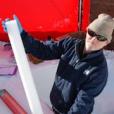Roadmap for future development of sovereign infrastructure, capabilities and expertise
ANSTO has a new roadmap for future development of its sovereign infrastructure, capabilities and expertise.

Showing 761 - 780 of 1129 results
ANSTO has a new roadmap for future development of its sovereign infrastructure, capabilities and expertise.
Research will change understanding of Australian Aboriginal rock art found in rock shelters of the Kimberley and its relationship to a changing landscape

Use of nuclear techniques to benefit industry and consumers
On behalf of ANSTO thank you for your interest in our tours. We hope your visit to ANSTO will be both enjoyable and informative.
Blue Carbon Horizons Team showed coastal wetlands capture more carbon as sea levels rise
The new trilateral security partnership between Australia, the UK and the US (AUKUS) is a historically significant development for nuclear science and technology in Australia.


Originally from Switzerland, Dr Häusermann gained his PhD in x-ray diffraction and synchrotron techniques at King’s College London.
Thirty years of ANSTO's unique capability in monitoring fine particle pollution provides insight on bushfire smoke.

The IAEA is providing $1.3m over four years to implement a new, Australian-led patient-care project for the Asia and Pacific region
ANSTO’s CORIS360®, an advanced radiation imaging solution, has been awarded two Gold Good Design Awards from Good Design Australia, winning in the categories of Product Design/ Commercial and Industrial as well as Engineering Design.
Scientists at ANSTO together with Lithium Australia Limited (LIT) have developed a world-first technology to extract more lithium from lithium mining waste, in a game-changer for Australian lithium industry.
A team of Melbourne researchers and international partners from Italian Instituto Nazionale de Fisica Nucleare (INFN) and CERN, who are developing radiation-hardened semiconductor chips, used the unique state-of-art high energy ion microprobe on the SIRIUS ion accelerator at ANSTO’s Centre for Accelerator Science to test a prototype radiation-resistant computer chip